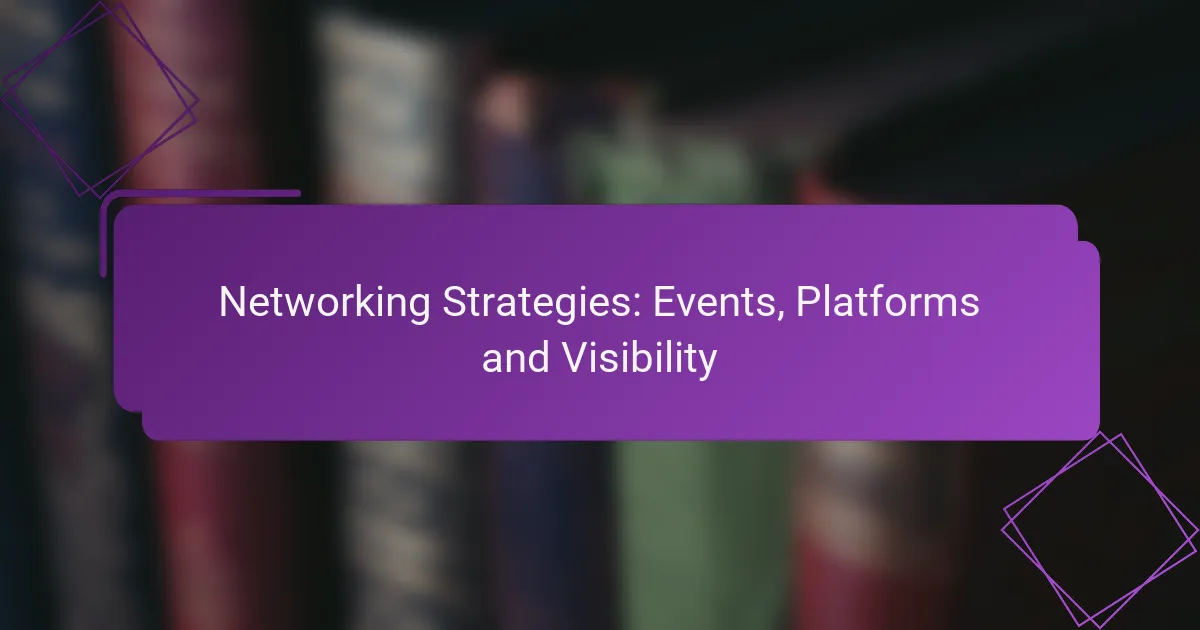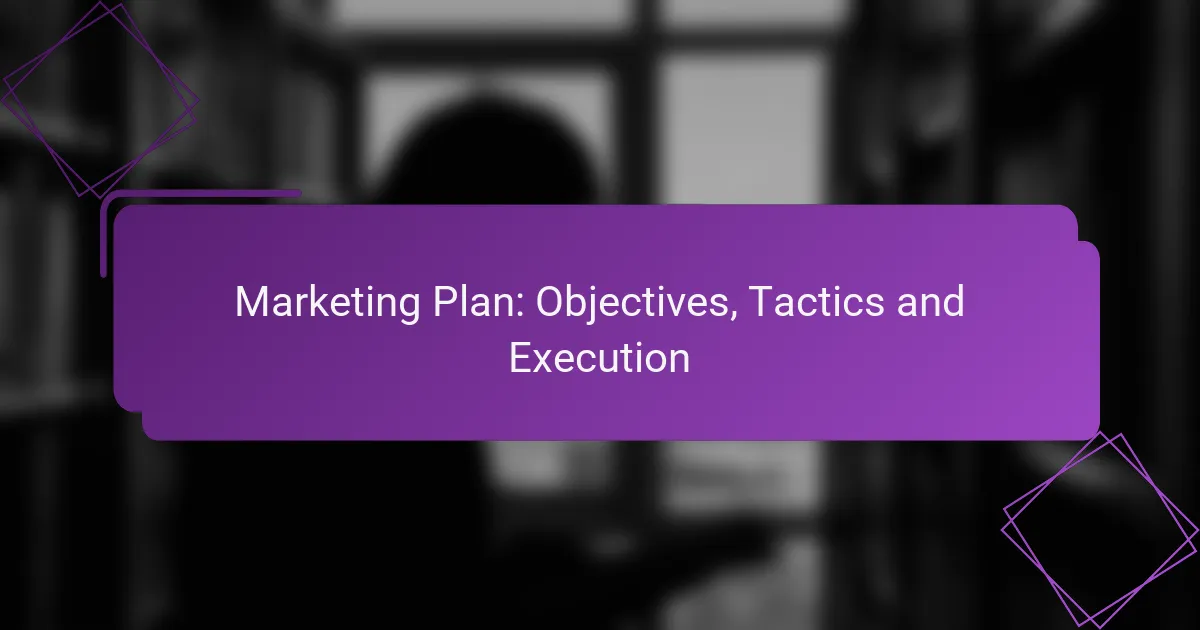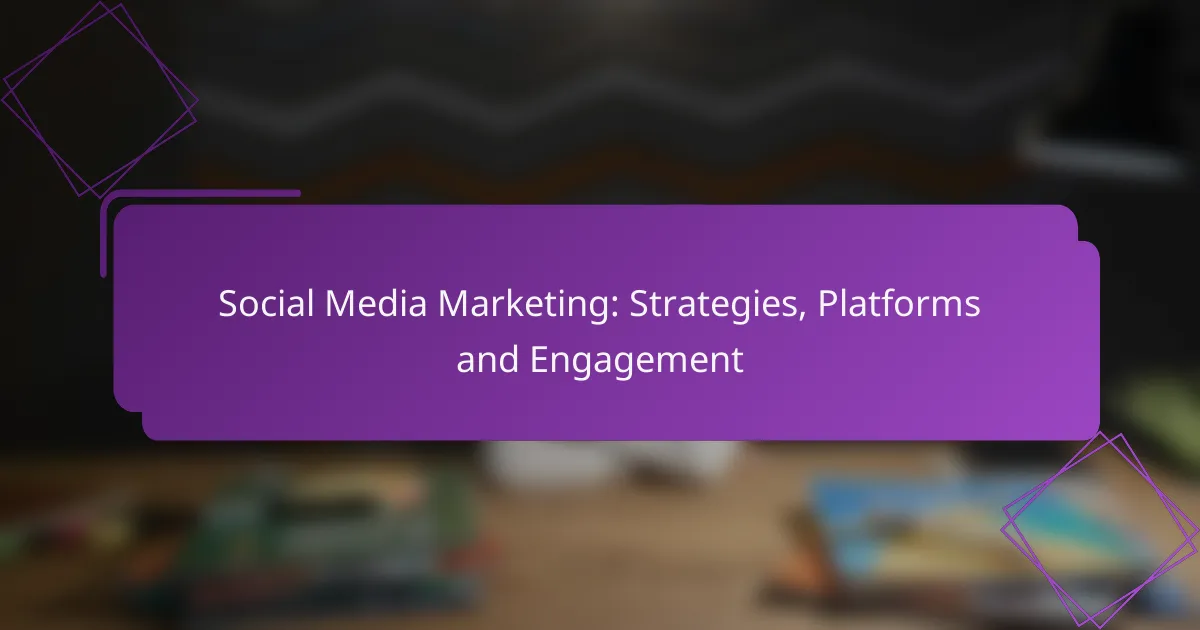Networking is a crucial component of professional growth, and effective strategies can significantly enhance visibility and connections. By actively participating in industry-specific events and utilizing online platforms, individuals can foster valuable relationships that lead to new opportunities. Selecting the right events based on audience alignment and accessibility further maximizes the potential for meaningful engagement.
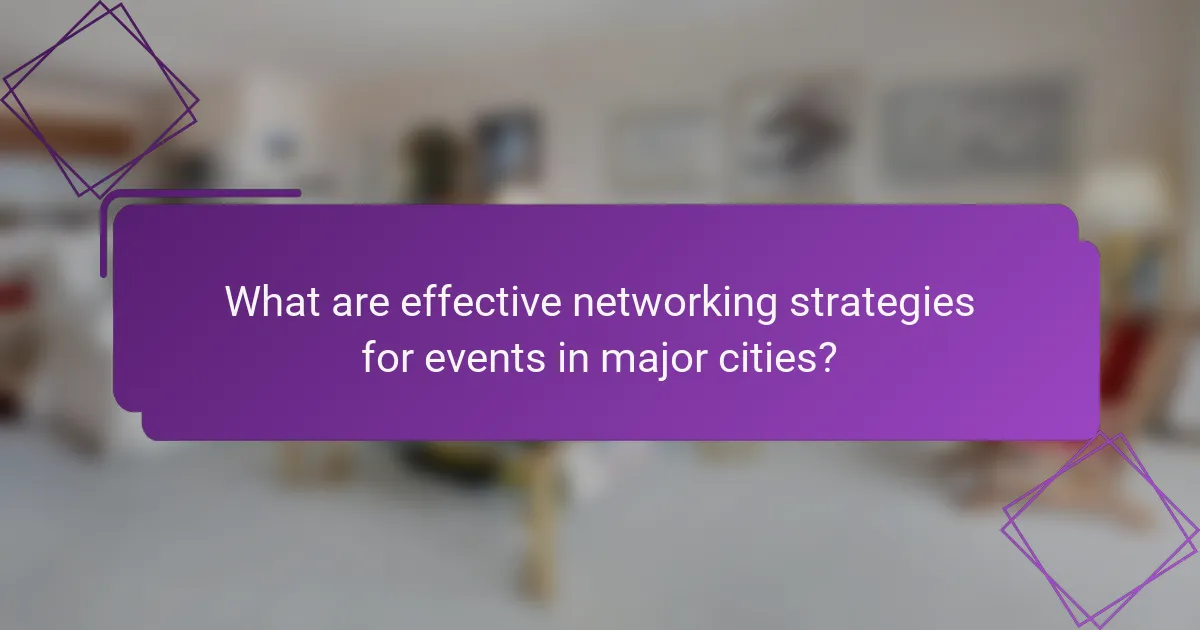
What are effective networking strategies for events in major cities?
Effective networking strategies for events in major cities include actively participating in various gatherings that foster professional connections. Engaging in industry-specific events, local meetups, and workshops can significantly enhance visibility and create valuable relationships.
Utilizing industry conferences
Industry conferences are prime opportunities for networking, bringing together professionals from specific fields. Attendees should prepare by researching speakers and participants to identify potential connections. Engaging in discussions during sessions and utilizing networking lounges can maximize interaction.
Consider setting specific goals for each conference, such as meeting a certain number of contacts or scheduling follow-up meetings. This focused approach can lead to more meaningful connections.
Leveraging local meetups
Local meetups offer a more informal setting for networking, often centered around shared interests or industries. These gatherings can be found on platforms like Meetup.com and are typically low-cost or free, making them accessible to many professionals.
To make the most of local meetups, actively participate in discussions and share insights. Follow up with attendees afterward to solidify connections and explore collaboration opportunities.
Participating in trade shows
Trade shows provide a platform for showcasing products and services while facilitating networking among industry peers. Attending these events allows professionals to meet potential clients and partners, as well as gain insights into market trends.
When attending trade shows, prepare promotional materials and business cards to distribute. Engaging in conversations at booths and attending workshops can enhance visibility and foster connections.
Engaging in workshops
Workshops offer hands-on learning experiences and opportunities to connect with like-minded individuals. Participating in workshops relevant to your field can help build skills while expanding your professional network.
During workshops, actively engage with instructors and participants. Sharing experiences and insights can lead to valuable discussions and potential collaborations beyond the workshop setting.
Joining networking dinners
Networking dinners provide a relaxed atmosphere for building relationships with industry peers. These events often feature guest speakers or themed discussions, creating a conducive environment for meaningful conversations.
To maximize networking at dinners, come prepared with questions and topics to discuss. Follow up with attendees afterward to reinforce connections and explore future collaboration possibilities.

How can online platforms enhance networking visibility?
Online platforms significantly boost networking visibility by providing access to a broader audience and facilitating connections that may not occur in traditional settings. They allow professionals to showcase their skills, engage with others in their field, and build relationships that can lead to opportunities.
Using LinkedIn for professional connections
LinkedIn is a powerful tool for enhancing professional visibility and making connections. By creating a comprehensive profile that highlights your skills and experiences, you can attract potential employers and collaborators.
Engage with your network by sharing relevant content, commenting on posts, and joining industry-specific groups. Regular activity increases your visibility and positions you as an active participant in your field.
Engaging in virtual networking events
Virtual networking events offer a unique opportunity to connect with professionals from various locations without the need for travel. These events often include webinars, workshops, and breakout sessions that facilitate interaction.
To maximize your experience, prepare by researching attendees and topics beforehand. Follow up with new contacts post-event to solidify connections and explore potential collaborations.
Participating in online forums
Online forums provide a space for discussion and knowledge sharing within specific industries or interests. Engaging in these communities can enhance your visibility and establish you as an expert.
Contribute regularly by answering questions, sharing insights, and providing valuable resources. This consistent participation can lead to meaningful connections and opportunities for collaboration.
Utilizing social media for outreach
Social media platforms like Twitter and Facebook can be effective for networking outreach. By sharing your expertise and engaging with industry leaders, you can expand your professional network.
Use targeted hashtags to reach a wider audience and participate in discussions relevant to your field. Be mindful of your online presence, as it reflects your professional brand and can influence potential connections.

What criteria should be considered when choosing networking events?
When selecting networking events, consider factors such as target audience alignment, event size and format, and location accessibility. These criteria help ensure that the event will effectively facilitate valuable connections and opportunities for collaboration.
Target audience alignment
Identifying the target audience is crucial for maximizing the benefits of networking events. Look for events where attendees share similar professional backgrounds, interests, or goals. This alignment increases the likelihood of meaningful interactions and potential partnerships.
For example, if you are in the tech industry, attending events focused on technology startups or innovation will connect you with like-minded professionals. Conversely, attending events outside your field may yield fewer relevant connections.
Event size and format
The size and format of an event can significantly impact networking opportunities. Smaller events often allow for more intimate conversations, while larger events may offer a wider variety of contacts but can be overwhelming. Consider what type of environment you thrive in when choosing an event.
Formats such as workshops or roundtable discussions can foster deeper engagement compared to traditional conferences. If you prefer direct interaction, look for events that include breakout sessions or networking hours.
Location accessibility
Location plays a vital role in your ability to attend networking events. Choose events that are easily accessible, whether they are local or require travel. Consider factors such as transportation options, accommodation availability, and the overall safety of the area.
For instance, events held in major cities often have better infrastructure for attendees, including public transport and hotels. However, local events can save on travel costs and time, making them more convenient for busy professionals.

How to measure the success of networking efforts?
Measuring the success of networking efforts involves assessing the quality and impact of connections made, engagement levels, and the business opportunities that arise. By focusing on specific metrics, you can gain insights into the effectiveness of your networking strategies.
Tracking new connections made
To effectively track new connections, maintain a detailed record of individuals you meet during networking events or online platforms. Use a spreadsheet or a customer relationship management (CRM) tool to log names, contact information, and the context of your interactions.
Consider categorizing connections based on their relevance to your goals, such as potential clients, collaborators, or mentors. This organization will help you prioritize follow-ups and tailor your approach for each group.
Evaluating follow-up engagement
Follow-up engagement is crucial for determining the strength of your networking efforts. Monitor responses to your outreach, whether through emails, social media messages, or phone calls. Aim for a response rate of at least 30-50% as a benchmark for effective engagement.
Utilize tools like email tracking software to analyze open and click-through rates. This data can help you refine your messaging and identify which connections are most responsive, allowing for more targeted future interactions.
Assessing business opportunities generated
Assessing business opportunities generated from networking can be done by tracking leads, referrals, or partnerships that arise from your connections. Keep a record of any new projects or contracts that can be directly linked to your networking efforts.
Set specific goals for the number of opportunities you aim to create within a given timeframe, such as quarterly or annually. Regularly review your progress and adjust your networking strategies based on which connections yield the best results.

What are the best practices for networking follow-ups?
Effective networking follow-ups are crucial for maintaining connections and building professional relationships. Best practices include personalizing your messages, scheduling informal meetings, and leveraging social media platforms to stay engaged.
Sending personalized messages
Personalized messages demonstrate genuine interest and help you stand out. Start by referencing your previous conversation or a specific detail that resonated with the person. This approach can significantly increase the likelihood of a response.
Keep your message concise and focused. Aim for a friendly tone while being professional. For example, you might say, “I enjoyed our discussion about sustainable business practices at the conference last week. I’d love to hear more about your insights on this topic.”
Scheduling coffee meetings
Scheduling coffee meetings is an effective way to deepen connections. Propose a casual meeting at a local café or a virtual coffee chat, depending on geographical constraints. This informal setting can foster open dialogue and strengthen your relationship.
When suggesting a meeting, offer a couple of time slots to make it easier for the other person to choose. For instance, “Would you be available for a coffee chat next Tuesday or Thursday afternoon?” This flexibility shows respect for their schedule.
Connecting on social media
Connecting on social media platforms like LinkedIn can enhance your networking efforts. After an initial meeting, send a connection request with a personalized note reminding them of your interaction. This helps keep you on their radar.
Engage with their content by liking or commenting on their posts to maintain visibility. Regular interactions can lead to more meaningful conversations and opportunities down the line. Aim to share relevant articles or insights that might interest them, reinforcing your connection.
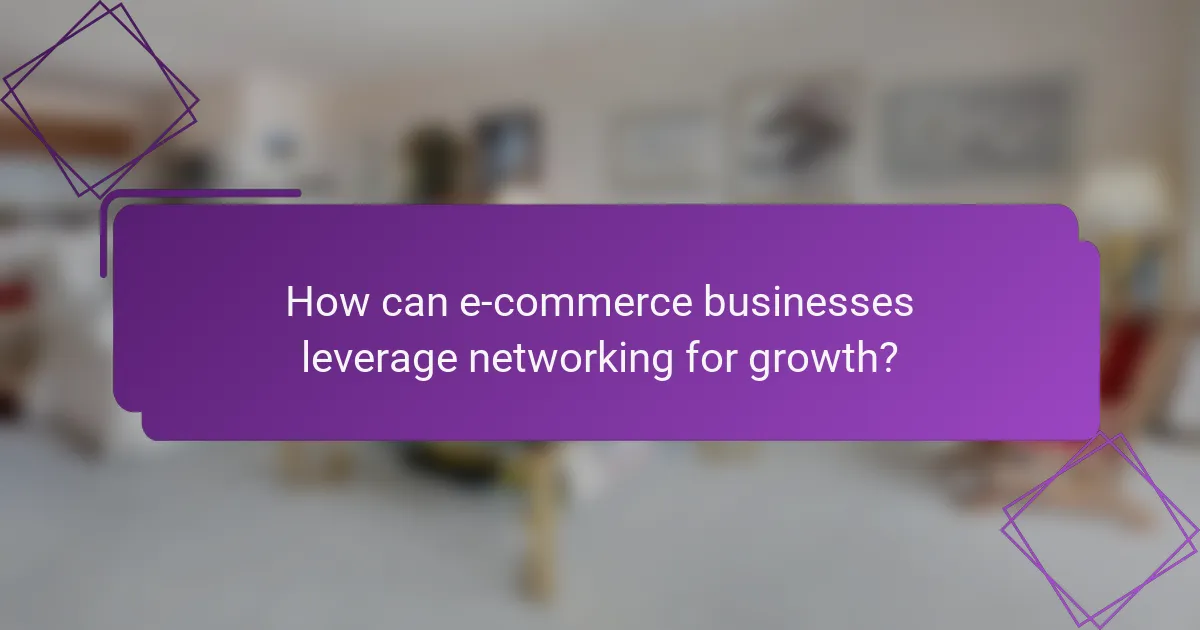
How can e-commerce businesses leverage networking for growth?
E-commerce businesses can leverage networking to foster relationships, gain insights, and create opportunities that drive growth. By engaging with industry peers, potential partners, and customers, these businesses can enhance their visibility and expand their reach in the market.
Networking Events
Networking events provide e-commerce businesses with the chance to connect face-to-face with industry professionals and potential clients. Attending trade shows, conferences, and local meetups can lead to valuable partnerships and collaborations. Consider participating in events that align with your niche to maximize relevance and impact.
When attending these events, prepare an elevator pitch and bring business cards. Follow up with new contacts after the event to solidify connections. Aim to attend at least a few key events each year to maintain visibility in the industry.
Online Networking Platforms
Online networking platforms like LinkedIn, Facebook groups, and industry-specific forums are essential for e-commerce businesses to connect with a broader audience. These platforms allow for sharing insights, asking questions, and building relationships without geographical limitations. Regularly engage with content and participate in discussions to increase your visibility.
Join groups that focus on e-commerce trends and challenges relevant to your business. Contributing valuable content or insights can position you as a thought leader in your field, attracting potential partners and customers.
Building Visibility
Building visibility is crucial for e-commerce growth, as it helps attract new customers and partners. Utilize social media, content marketing, and SEO strategies to enhance your online presence. Consistent branding and messaging across all platforms will help reinforce your identity and make your business memorable.
Consider hosting webinars or creating informative content that addresses common pain points in your industry. This not only showcases your expertise but also encourages networking opportunities as participants engage with your brand.
